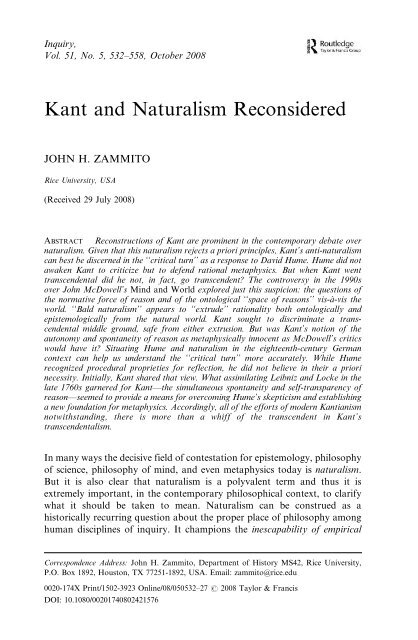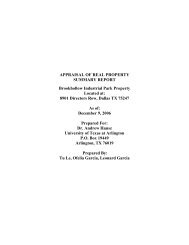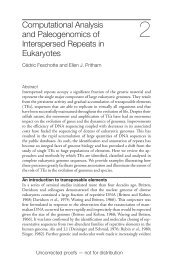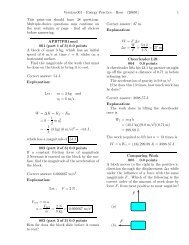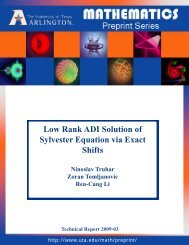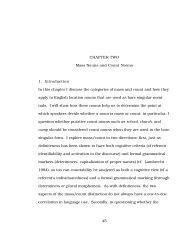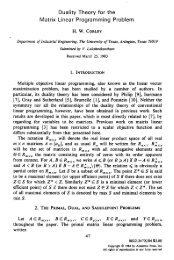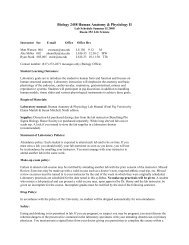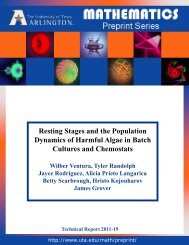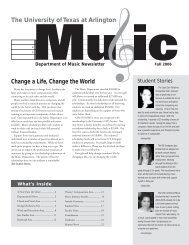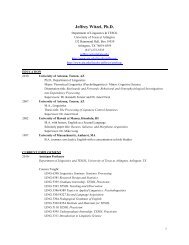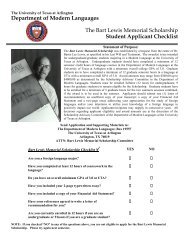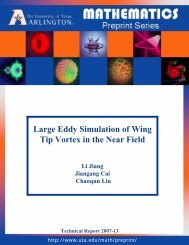Kant and Naturalism Reconsidered
Kant and Naturalism Reconsidered
Kant and Naturalism Reconsidered
You also want an ePaper? Increase the reach of your titles
YUMPU automatically turns print PDFs into web optimized ePapers that Google loves.
536 John H. Zammitoa priori truths. The collapse of traditional philosophy of science, <strong>and</strong> with itthe old illusion of ‘‘first philosophy’’ that there exist a priori st<strong>and</strong>ardsagainst which philosophers could hold scientific achievements to assay theirworth, was a striking feature of the fin de siècle we have just undergone. AsPhilip Kitcher has observed, naturalists have concluded ‘‘the failure ofappeals to conceptual truth, to analyticity, is fully general.’’ Accordingly,‘‘virtually nothing is knowable a priori, <strong>and</strong>, in particular, no epistemologicalprinciple is knowable a priori.’’ 32 Since, instead, ‘‘knowledge isembedded in the history of human knowledge, <strong>and</strong> not detachable from it,’’we are ‘‘ineluctably dependent on the past.’’ He concludes, ‘‘the denial of thea priori thus leads … to a position whose emphasis on the growth ofknowledge invites the title ‘historicism.’’’ 33As Kornblith infers, ‘‘if there are no a priori truths, then [traditional]epistemology is misguided. Epistemology cannot precede science.’’ He offersthe naturalist alternative: ‘‘we wish to know what it is about us that allowsus to underst<strong>and</strong> the world [<strong>and</strong>] we wish to know what it is about the worldthat allows it to be known.’’ That means ‘‘it is the investigation ofknowledge as a phenomenon in the world which distinguishes naturalismfrom other approaches to knowledge.’’ 34 Epistemology must be continuouswith science, asking how it is possible that knowledge has in fact occurred. 35But this is human knowledge in this world, not a priori knowledge in allpossible worlds. 36 As Nicholas Rescher puts it, ‘‘Science as we have it—theonly ‘science’ that we ourselves know—is a specifically human artifact thatmust be expected to reflect in significant degree the particular characteristicsof its makers.’’ 37 The work of the last fifty years has demolished the unifiedtheory of ‘‘science’’ which logical positivism/empiricism projected uponactual natural-scientific practices <strong>and</strong> presumed to discredit the very idea ofthe human sciences. 38To bring this directly back to <strong>Kant</strong>, when he asked how our knowledgewas possible, he argued that it was only possible because of the synthesis ofspontaneous a priori forms of reason with sensations received <strong>and</strong> arrayed ina priori space-time intuition. The famous slogan went: ‘‘Thoughts withoutcontent are empty, intuitions without concepts are blind’’ (A51/B75). 39 Butthe real question is the a priori character of both underst<strong>and</strong>ing <strong>and</strong>sensibility: how were these <strong>and</strong> only these necessary <strong>and</strong> necessarily known?The issue arises most clearly in the revised version (1787) of the firstCritique: ‘‘This peculiarity of our underst<strong>and</strong>ing, that it can produce a prioriunity of apperception solely by means of the categories, <strong>and</strong> only such <strong>and</strong>so many, is as little capable of further explanation as why we have just these<strong>and</strong> no other functions of judgment, or why space <strong>and</strong> time are the onlyforms of our possible intuition’’ (B145-6). This same ‘‘inscrutability’’ wasfully entailed in the 1781 version of the first Critique, with its speculativegesture to a common but unknown root of sensibility <strong>and</strong> underst<strong>and</strong>ing(A15/B29).
<strong>Kant</strong> <strong>and</strong> <strong>Naturalism</strong> <strong>Reconsidered</strong> 537The question is whether when <strong>Kant</strong> went transcendental he did not, infact, go transcendent. Just this suspicion provoked the controversy in the1990s over John McDowell’s Mind <strong>and</strong> World. McDowell claimed that <strong>Kant</strong>should <strong>and</strong> could have been a natural epistemologist (in McDowell’sparticular ‘‘relaxed’’ sense), but he didn’t because transcendental idealismremained, despite <strong>Kant</strong>, yet another ‘‘rampant Platonism.’’ 40 Such anallegation roused the <strong>Kant</strong>ian community to fierce objections, <strong>and</strong> it is not acoincidence that two of these <strong>Kant</strong>ians should also have been among ourthree presidents seeking to orchestrate the funeral rites of naturalism:Michael Friedman <strong>and</strong> Henry Allison. Nor, finally, is it surprising that thefirst salvo of this <strong>Kant</strong>ian rejection of McDowell should have come fromGraham Bird, for his was the distinction of having actually published anessay with the title ‘‘<strong>Kant</strong> <strong>and</strong> <strong>Naturalism</strong>’’ whose ambition—with referenceto <strong>Kant</strong> (at least)—was to make ‘‘the term [naturalism] less fashionable.’’ 41Bird’s essay, ‘‘<strong>Kant</strong> <strong>and</strong> <strong>Naturalism</strong>,’’ is really an extended commentaryon Skorupski (1993), whose main narrative line characterized modernphilosophy as a protracted debate between naturalism <strong>and</strong> its opponents. 42Skorupski traced the origins of this long debate to the contest of <strong>Kant</strong> withHume, <strong>and</strong> this is what provoked Bird. The latter was not comfortable withthe manner in which Skorupski construes <strong>Kant</strong>’s ‘‘anti-naturalism.’’ For onething, Bird is skeptical that <strong>Kant</strong>’s use of ‘‘naturalism’’ can be taken assubstantive enough to warrant any claim about its meaningfulness for hisviews of Hume, empiricism <strong>and</strong> skepticism. Indeed, in one of <strong>Kant</strong>’s uses of‘‘naturalism,’’ he ‘‘allies himself with Hume as an anti-naturalist against thecommon-sense philosophers.’’ 43 For Bird, the essential issue is to disputethe ‘‘traditional’’ two-world construal of <strong>Kant</strong>’s transcendental idealism onthe basis of a two-view approach—more methodological than metaphysical,or at least more epistemological than ontological. P. F. Strawson appears tobe Bird’s exemplar of the false, metaphysical reading, which others havetermed the ‘‘myth of the noumenal.’’ 44 Bird, along with Henry Allison, hasbeen prominent in developing the revisionist view. 45 As Bird puts it: ‘‘It isnot that there really are two distinct realms, a natural, empirical realm <strong>and</strong> anon-natural, transcendent realm of things-in-themselves; rather there is justone realm, empirical reality, <strong>and</strong> a conceptual apparatus which tempts us totranscend it.’’ 46 It is on this basis that he takes offense at McDowell’sinvocation of <strong>Kant</strong>.McDowell clearly draws on Strawson for his sense of <strong>Kant</strong>, Bird notes,but ‘‘Strawson’s <strong>Kant</strong> is not <strong>Kant</strong>, <strong>and</strong> so McDowell’s <strong>Kant</strong> is not <strong>Kant</strong>either.’’ 47 While McDowell believes that a ‘‘wish to safeguard moral <strong>and</strong>religious beliefs had a part to play’’ 48 in <strong>Kant</strong>’s cognitive theory oftranscendental idealism (‘‘to deny knowledge in order to make room forfaith,’’ as <strong>Kant</strong> famously put it [<strong>Kant</strong>, Bxxx]), Bird insists that theepistemological <strong>and</strong> the moral contexts of <strong>Kant</strong>’s invocations of the‘‘supersensible’’ be kept distinct. More concretely: ‘‘It is uncontroversial that
538 John H. Zammito<strong>Kant</strong> allows a conceptual reference to noumena quite generally. Such thingsare for us conceptually or logically, but not really, possible.’’ This is where itis important, Bird argues, to recognize the difference between ‘‘transcendental’’<strong>and</strong> ‘‘transcendent,’’ but ‘‘McDowell not only draws no distinctionbetween the transcendental <strong>and</strong> the transcendent, but also conflatesthem…’’ 49 The transcendental for Bird is safely immanent <strong>and</strong> formal.McDowell’s failure to acknowledge this leads to a fatal misconstrual of<strong>Kant</strong>. Bird invokes ‘‘Carnap’s distinction between the material <strong>and</strong> theformal modes of speech’’ to explain <strong>Kant</strong>. That is, ‘‘<strong>Kant</strong>’s vocabulary …indicates … a claim about the formal conditions presupposed by someaspects of experience, <strong>and</strong> not a material reference to some supersensibleitem which chronologically precedes it.’’ Thus, <strong>Kant</strong>’s claims should be readnot as ‘‘empirical, causal, or psychological, but modal <strong>and</strong> epistemic.’’ 50Michael Friedman makes a similar critique, contending that McDowell‘‘presents a seriously misleading conception of the underst<strong>and</strong>ing’’ in <strong>Kant</strong>.He elaborates:For <strong>Kant</strong>, our sensible experience is necessarily governed by <strong>and</strong>framed within a ‘space of reasons’ consisting, essentially, of logical <strong>and</strong>mathematical relations; <strong>and</strong> there can be no question, therefore, of anepistemological gap between such rational relations on the one side<strong>and</strong> our sensible experience on the other. Nor can there …be anontological gap between nature as the object of modern mathematicalscience <strong>and</strong> the ‘space of reasons’ arising from the necessaryinteraction of pure underst<strong>and</strong>ing <strong>and</strong> a priori sensibility—there canbe no threat of anything like rampant platonism from <strong>Kant</strong>’s ownpoint of view. 51Like Bird (<strong>and</strong> Allison), Friedman offers an innocuous notion of thenoumenal in <strong>Kant</strong>’s (cognitive) philosophy: ‘‘the idea of a thing in itselfarises by abstracting the concepts of pure underst<strong>and</strong>ing from theirnecessary application to sensibility. The idea of a noumenon or thing initself is the idea of an object thought through pure underst<strong>and</strong>ing alone,independently of sensibility.’’ Friedman makes much of the distinction ofthe faculty of underst<strong>and</strong>ing from the faculty of reason in <strong>Kant</strong>, arguingthat ‘‘underst<strong>and</strong>ing is… precisely the faculty responsible for the intelligibilityof the realm of law .. constituted by the logical <strong>and</strong> mathematicalrelations resulting from the necessary application of pure underst<strong>and</strong>ing topure sensibility, <strong>and</strong> as such it makes nature—considered precisely as theobject of modern mathematical science—first possible.’’ In a note he adds:‘‘This is the heart of <strong>Kant</strong>’s reply to Humean naturalism.’’ 52Friedman traces this crucial notion of pure conceptual constitutionthrough the ‘‘logical school’’ of the late nineteenth century from Marburg
<strong>Kant</strong> <strong>and</strong> <strong>Naturalism</strong> <strong>Reconsidered</strong> 539Neo-<strong>Kant</strong>ianism to the Viennese logical positivists he has been at such painsto redeem for current philosophy. 53What <strong>Kant</strong> calls ‘transcendental logic’ is just as distinct from empiricalhuman psychology as is the pure thought of the reine Logik tradition.For <strong>Kant</strong>, however, the entire point of the schematism of theunderst<strong>and</strong>ing is that pure thought can have content only byfunctioning as the a priori presupposition of empirical thinking(including, in particular, empirical psychological thinking). <strong>Kant</strong>’s‘space of reasons’ is thus necessarily spatiotemporal. 54<strong>Kant</strong> postulated a priori intuition as the necessary complement to logic inorder to warrant the possibility of experience. The point, common to <strong>Kant</strong><strong>and</strong> to his more recent successors, is that ‘‘the logical structure constitutingthe space of reasons does not subsist in an autonomous ontological realmbut rather in the meaning relations of language.’’ 55For Friedman, ‘‘McDowell’s problematic of an opposition betweenreason <strong>and</strong> nature really first arises in the context of contemporary post-Quinean naturalism.’’ Friedman takes Quine as an unequivocally strongnaturalist, i.e., a physical reductionist. He sees Donald Davidson as tryingto salvage a ‘‘space of reasons’’ from Quine’s view, <strong>and</strong> therefore he feelscalled upon to defend Davidson from McDowell’s strictures. ‘‘Davidson, invirtue of the residual Quinean naturalism <strong>and</strong> physicalism expressed in hisanomalous monism, has a robust conception of the independence of thereality to which we are (causally) related in sense experience.’’ Accordingly,‘‘McDowell’s own position is actually more idealistic than Davidson’s.’’ 56 Inhis presidential address, Friedman carries this line of argument from thecriticism of McDowell to the criticism of Quinean naturalism. He takes asQuine’s crucial claim that ‘‘there is no Archimedean point from whichphilosophy could hope to justify natural science from some better grounded<strong>and</strong> more certain perspective.’’ 57 He insists this is an inappropriate criticismof Carnap, for ‘‘neither in the Aufbau nor in his later works did Carnap sethimself the goal of grounding, justifying, or ‘validating’ science from somesupposedly higher <strong>and</strong> more certain philosophical vantage point.’’ On theother h<strong>and</strong>, Quine’s argument against the a priori ‘‘challenges both Carnap’sexplanation of the special a priori status of logic <strong>and</strong> mathematics … <strong>and</strong>Carnap’s explanation of the special, non-empirical status of philosophy,’’<strong>and</strong> this ‘‘provides the strongest support for contemporary philosophicalnaturalism.’’ Friedman sees this attack on the a priori as linked to Quine’sdoctrine of the indeterminacy of translation <strong>and</strong> he finds the reductionistphysicalism tacit in that view suspect. Instead, Friedman reverts to <strong>Kant</strong><strong>and</strong> the later ‘‘relativization of the <strong>Kant</strong>ian a priori’’ by the logicalpositivists, who thus anticipated Quine’s other claim of semantic holism:‘‘conditions of possibility or necessary presuppositions of empirical natural
540 John H. Zammitoscience should not be viewed as rigidly fixed for all time, as forever immuneto revision.’’ Recent mathematical physics demonstrates the persistence, notthe redundancy of the ‘‘constitutive a priori,’’ <strong>and</strong> failure to see this,Friedman writes, is the ‘‘most peculiar <strong>and</strong>, I am tempted to say, mostperverse, legacy of contemporary philosophical naturalism.’’ 58Allison joins Bird <strong>and</strong> Friedman in taking McDowell to task formisunderst<strong>and</strong>ing <strong>Kant</strong>. While he agrees with McDowell against ‘‘baldnaturalism’’ that ‘‘movement within the space of reasons (judgment <strong>and</strong>inference) is governed by normative principles accepted by the subject ratherthan by the mere reception of sensory data,’’ <strong>and</strong> hence the ‘‘essentiallynormative <strong>Kant</strong>ian conception can[not] itself be naturalized,’’ Allison, likethe others, maintains ‘‘the real problem with McDowell’s <strong>Kant</strong> critique isthe interpretation of transcendental idealism,’’ which, he alleges, is a‘‘complete failure to appreciate the ‘critical’ nature of <strong>Kant</strong>’s idealism.’’ 59 Toclarify transcendental idealism, Allison suggests it should be contrasted notwith empiricism but with transcendental realism. According to Allison, the‘‘‘critical,’ demythologized conception of the noumenon … is just that of alimiting concept,’’ i.e., ‘‘drawing a transcendental (not an ontological)distinction between things as they appear (subject to the conditions ofhuman cognition) <strong>and</strong> as they are in themselves (thought independently ofthese conditions).’’ To ‘‘ontologize the transcendental distinction’’ thus‘‘elevat[es] a contrast between two ways of considering things into onebetween two modes of being (real <strong>and</strong> apparent).’’ Transcendental idealismis ‘‘a normative <strong>and</strong> conceptual, not an ontological space [of reasons].’’ 60Two different pressures on transcendental idealism can be discerned in thedebate over McDowell’s reception of <strong>Kant</strong>. First there is the question of thenormative force of reason or logic, a force <strong>Kant</strong> associated with a priorinecessity. But second there is the ontological question about this ‘‘space ofreasons’’ <strong>and</strong> its elements: what place can they have in reality? 61 ‘‘Baldnaturalism’’ appears to ‘‘extrude’’ rationality both ontologically <strong>and</strong>epistemologically from the natural world. <strong>Kant</strong>’s effort to discriminate atranscendental middle ground, safe from either extrusion, seems to be justtoo transcendent for ‘‘bald’’ naturalism, <strong>and</strong> if it gets domesticated into a‘‘relaxed’’ naturalism, it seems to forsake all the normative force that madeit attractive to <strong>Kant</strong> in the first place. That is the presentist conundrum; butthere is a historical one, too. Was <strong>Kant</strong>’s notion of the autonomy <strong>and</strong>spontaneity of reason as metaphysically innocent as Bird, Friedman <strong>and</strong>Allison want to have it? Is the ‘‘two-world’’ view just a ‘‘practical’’addendum to the critical system? Have they got <strong>Kant</strong> altogether right?The hornet’s nest stirred by McDowell indicates that there are explosiveissues in the question of <strong>Kant</strong> <strong>and</strong> naturalism. What can a dose ofhistoricism add? How should we reconstruct the question of <strong>Kant</strong> <strong>and</strong>naturalism historically? As Lothar Kreimendahl puts it, ‘‘no one any longerexpect[s] from the reconstruction of the history of the emergence or
<strong>Kant</strong> <strong>and</strong> <strong>Naturalism</strong> <strong>Reconsidered</strong> 541development of <strong>Kant</strong>’s critical philosophy any directing insight for itssystematic interpretation or superior underst<strong>and</strong>ing.’’ 62 Yet historical issueshave resurfaced concerning the moment—or perhaps the series ofmoments—at which <strong>Kant</strong> worked out the decisive lineaments of transcendentalphilosophy. 63II. <strong>Kant</strong>, Hume, naturalism <strong>and</strong> the critical turn<strong>Kant</strong> starts the Preface to the A-version of the first Critique with languagewhich unmistakably highlights the intrinsic dialectic of reason: ‘‘Humanreason … is burdened by questions which, as prescribed by the very natureof reason itself, it is not able to ignore, but which, as transcending all itspowers, it is also not able to answer’’ (Avii). This is the most eloquenttestimony that the ‘‘antinomy problem’’ lay at the origin of the criticalphilosophy, just as <strong>Kant</strong> claimed many years later in a letter to ChristianGarve. 64 But what <strong>Kant</strong> goes on to write in this Preface widens ourperspective, for if the antinomy problem is <strong>Kant</strong>’s unique philosophicalformulation, the crisis of metaphysics belonged to the age. ‘‘The changedfashion of the time brings [metaphysics, once the Queen of all the sciences]only scorn… her empire gradually through intestine war gave way tocomplete anarchy’’ (Aviii-ix). In his letter to Mendelssohn in 1783, <strong>Kant</strong>adopts a similar view of the fate of metaphysics in his time: ‘‘That you feelyourself dead to metaphysics does not offend me, since virtually the entirelearned world seems to be dead to her.’’ 65To characterize this new despair <strong>and</strong> quietism <strong>Kant</strong> adopted a newpejorative term, ‘‘indifferentism’’:And now, after all methods, so it is believed, have been tried <strong>and</strong>found wanting, the prevailing mood is that of weariness <strong>and</strong> completeindifferentism—the mother, in all sciences, of chaos <strong>and</strong> night, buthappily in this case the source, or at least the prelude, of theirapproaching reform <strong>and</strong> restoration.But it is idle to feign indifference to such enquiries, the object of whichcan never be indifferent to our human nature. Indeed these pretendedindifferentists, however they may try to disguise themselves bysubstituting a popular tone for the language of the Schools, inevitablyfall back, in so far as they think at all, into those very metaphysicalassertions which they profess so greatly to despise. (Ax)Still, <strong>Kant</strong> claims that this phenomenon of indifferentism ‘‘calls forattention <strong>and</strong> reflection’’ because ‘‘it is obviously the effect not of levitybut of the matured judgment of the age, which refuses to be any longer putoff with illusory knowledge’’ (Axi). In a note to this passage, <strong>Kant</strong> makes
542 John H. Zammitoexplicit his affirmation of his times as an age of enlightenment: ‘‘Our age is,in especial degree, the age of criticism, <strong>and</strong> to criticism everything mustsubmit’’ (Axi, n). <strong>Kant</strong>’s thrust in the note is that skepticism should not besuppressed by edict, but answered by reason. ‘‘It is a call to reason toundertake anew the most difficult of all its tasks, namely, that of selfknowledge…the critique of pure reason’’ (Axi–xii).It would appear a seamless transition to pick up <strong>Kant</strong>’s thread of thoughtwhile jumping across the entire expanse of the first Critique to Ch. I, Section2 of the ‘‘Transcendental Doctrine of Method’’—the ‘‘Discipline of PureReason in Respect of Its Polemical Employment.’’ The chapter opens withanother ringing endorsement of enlightenment critique: ‘‘Nothing is soimportant through its usefulness, nothing so sacred, that it may be exemptedfrom this searching examination… Reason depends on this freedom for itsvery existence’’ (A736/B766). The particular context of the ‘‘polemical use’’of reason is the situation in which reason is interested not so much inmaking a definitive case for a belief but rather in insulating vital beliefs fromdefinitive refutation: it is a defensive strategy, acceptable, <strong>Kant</strong> notes, kat’anthropon even if never secure kat’ aletheian (A737/B767). <strong>Kant</strong> dismissesthe hope that someday a dogmatic-rational metaphysics might succeed inthe proof of God or immortality. Such proofs are impossible, as are proofsof their contraries (A741-2/B769-70). <strong>Kant</strong>, indeed, welcomes any studywhich endeavors to refute categorically a dogma vital to human interest.‘‘Already, before having opened it, I am perfectly certain … that, as reasonis incompetent to arrive at affirmative assertions in this field, it is equallyunable, indeed even less able, to establish negative conclusions in regard tothese questions’’ (A753/B781). And that means, for <strong>Kant</strong>, that ‘‘we arealways in a position to accept these propositions—propositions which are sovery closely bound up with the speculative interests of our reason in itsempirical employment, <strong>and</strong> which, moreover, are the sole means ofreconciling the speculative with the practical interest’’ (A742/B770). Thatis, ‘‘although we have to surrender the language of knowledge, we still havesufficient ground to employ, in the presence of the most exacting reason, thequite legitimate language of a firm faith’’ (A745/B773).It is in this dramatic context of ‘‘rational faith’’ that <strong>Kant</strong> turns to DavidHume <strong>and</strong> the problem of skepticism. While he characterizes Hume as‘‘dispassionate’’ <strong>and</strong> ‘‘peculiarly fitted for balanced judgment,’’ as ‘‘welldisposed <strong>and</strong> in his moral character quite blameless,’’ he also charges himwith ‘‘far-fetched subtleties … elaborately thought out,’’ which threatenedto ‘‘undermine … the conviction which is so comforting <strong>and</strong> beneficial formankind’’ (A745/B773). 66 <strong>Kant</strong> concedes that Hume might defend himselfwith the claim that he was simply in the service of critical reason in itsruthless inquisition of dogmas, since ‘‘it is the duty of philosophy tocounteract their deceptive influence, no matter what prized <strong>and</strong> cherished
<strong>Kant</strong> <strong>and</strong> <strong>Naturalism</strong> <strong>Reconsidered</strong> 543dreams may have to be disowned’’ (Axiii). But—<strong>and</strong> this is the decisivepoint—<strong>Kant</strong> is not prepared to linger in aporia:But to allow ourselves simply to acquiesce in these doubts, <strong>and</strong>thereupon to set out to commend the conviction <strong>and</strong> admission of ourignorance not merely as a remedy against the complacency of thedogmatists, but likewise as the right method of putting an end to theconflict of reason with itself, is a futile procedure, <strong>and</strong> can never sufficeto overcome the restlessness of reason. At best it is merely a means ofawakening it from its sweet dogmatic dreams, <strong>and</strong> of inducing it to enterupon a more careful examination of its own position. (A757/B785)While skepticism can be a ‘‘resting-place for human reason, where it canreflect upon its dogmatic w<strong>and</strong>erings,’’ it is no ‘‘dwelling-place forpermanent settlement’’ (A757/B785). <strong>Kant</strong> invokes the image of the skepticas a nomad. This is, without the term, the pith of <strong>Kant</strong>’s denunciation of‘‘indifferentism’’ from the A-Preface (Aix).<strong>Kant</strong> respects the skeptical method: ‘‘In metaphysics, where our reasoningconcerning the vocation of man goes beyond the bounds of the world <strong>and</strong>experience, where we have nothing to guide us, the skeptical method isappropriate’’ (AA:29:1). 67 But <strong>Kant</strong> insists that the skeptical method bedistinguished from a skeptical philosophy. 68 Skeptical method is a goodthing ‘‘provided only that one does not have the constant resolve to doubteverything forever, <strong>and</strong> to leave everything undecided… The withholding ofapproval .. with the intentional inclination never to decide anything is reallynothing but a lazy doubt, a lazy addiction to doubt [faule Zweifelsucht],’’<strong>and</strong> ‘‘no more miserable condition for man can be thought … than thecondition that leaves us undecided .. particularly … when it affects ourinterests.’’ 69 <strong>Kant</strong> insists that the vital human interest in metaphysicalconcepts militates against a skeptical (‘‘indifferentist’’) aporia. ‘‘If somethingis very weighty for us <strong>and</strong> of very great importance, so that a greatpart, indeed, even the greatest part of our peace of mind <strong>and</strong> of our externalwell-being <strong>and</strong> happiness depend upon it, then in this case the mind is justnot free enough to consider the matter indifferently <strong>and</strong> impartially from allsides.’’ 70 Where does that leave Hume?In a lecture we can date fairly confidently to the period shortly after <strong>Kant</strong>published his Inaugural Dissertation, he presented his students with anextended characterization of David Hume:In most recent time, David Hume is especially known as a scepticuswho had an overwhelming, indeed, a somewhat extravagant inclinationto doubt. His writings, which appeared before the learned worldunder the title, ‘‘Philosophical Inquiries,’’ <strong>and</strong> were also called‘‘Miscellaneous Writings,’’ contained political articles, essays on
544 John H. Zammitoliterature, moral <strong>and</strong> also metaphysical articles[;] but they all tendedtoward to [sic] skepticism. In these writings of Hume is to be found agentle, calm, unprejudiced examination. In them he considers, namely,first of all one side of a thing; he searches for all possible grounds forit, <strong>and</strong> expounds them in the best oratorical style. Then he takes up theother side, presents it for examination, as it were, completely withoutpartisanship, expounds again all the opposing grounds with just thesame eloquence, but at the end <strong>and</strong> in conclusion he appears in his trueform as a real skeptic[;] he complains about the uncertainty of all ourcognition whatsoever, shows how little these can be trusted, <strong>and</strong> finallyhe doubts instead of inferring <strong>and</strong> settling which of the two cognitionsis true <strong>and</strong> which false. He would, however, certainly be one of the bestauthors, <strong>and</strong> one of those most worthy of being read, if only he did nothave the preponderant inclination to doubt everything, but insteadwanted to seek to attain a true certainty by means of the examination<strong>and</strong> investigation of cognitions. 71Thus, already here <strong>Kant</strong> stresses the extravagance of Hume’s skepticism <strong>and</strong>insists upon the prospect of attaining certainty through an analysis ofcognitive process. Certainly ten years later, in the first Critique, <strong>Kant</strong> tookHume to task for excessive skepticism. The A-Preface <strong>and</strong> the ‘‘Discipline ofPure Reason in Respect of Its Polemical Employment’’ of the Critique ofPure Reason constitute the locus classicus for <strong>Kant</strong>’s repudiation of Hume<strong>and</strong> skepticism.<strong>Kant</strong> recognized Hume as ‘‘perhaps the most ingenious of all the sceptics,<strong>and</strong> beyond all question … without rival in respect of the influence whichthe sceptical procedure can exercise in awakening reason to a thorough selfexamination’’(A764/B792). 72 Where Hume went wrong, according to <strong>Kant</strong>,was ‘‘in inferring from the contingency of our determination in accordancewith the law the contingency of the law itself’’ (A766/B794). ‘‘The celebratedDavid Hume,’’ <strong>Kant</strong> writes, ‘‘was one of those geographers of humanreason who have imagined that they have sufficiently disposed of all suchquestions by setting them outside the horizon of human reason—a horizonwhich yet he was not able to determine’’ (A760/B788). Thus he ‘‘regarded allthe supposed a priori principles … as … nothing but a custom-bred habitarising from experience <strong>and</strong> its laws, <strong>and</strong> … consequently merely empirical,that is, rules that are in themselves contingent, <strong>and</strong> to which we ascribe asuppositious necessity <strong>and</strong> universality’’ (A765/B793). 73Here <strong>Kant</strong> launched his gr<strong>and</strong> narrative of the history of philosophy, withits climactic moment, the overcoming of skepticism.The first step in matters of pure reason, marking its infancy, isdogmatic. The second step is sceptical; <strong>and</strong> indicates that experiencehas rendered our judgment wiser <strong>and</strong> more circumspect. But a third
<strong>Kant</strong> <strong>and</strong> <strong>Naturalism</strong> <strong>Reconsidered</strong> 545step, such as can be taken only by fully matured judgment, based onassured principles of proved universality, is now necessary, namely, tosubject to examination, not the facts of reason, but reason itself, in thewhole extent of its powers, <strong>and</strong> as regards its aptitude for pure a priorimodes of knowledge. This is not the censorship but the criticism ofreason, whereby not its present bounds but its determinate [<strong>and</strong>necessary] limits … are demonstrated from principles. (A761/B789)<strong>Kant</strong> credited Hume merely with censorship, not critique of reason. That wasonly a second, negative moment in the evolution of philosophical underst<strong>and</strong>ing.By ascending to a timeless universality, criticism is the restorationor redemption of the naive interests of dogmatic reason on epistemologicallyunassailable grounds. 74At least <strong>Kant</strong> credited Hume with scientific method. Far more scathing is<strong>Kant</strong>’s denunciation of what he called ‘‘naturalism.’’The naturalist of pure reason adopts as his principle that throughcommon reason, without science, that is, through what he calls soundreason, he is able, in regard to those most sublime questions which formthe problem of metaphysics, to achieve more than is possible throughspeculation… This is mere misology, reduced to principles; <strong>and</strong> what ismost absurd of all, the neglect of all artificial means is eulogised as aspecial method for extending our knowledge. (A835/B863)<strong>Kant</strong>’s target here was popular philosophy, especially as it proclaimed thesuperiority of common sense over rigorous philosophy. His contempt wasblatant. Lewis Beck holds that <strong>Kant</strong> never had any patience for‘‘naturalism’’ in this sense. 75 His disdain can be traced across the wholespan of <strong>Kant</strong>’s works, from his Universal Natural History to Religion withinthe Limits of Reason Alone <strong>and</strong> The Conflict of the Faculties. 76 In all thesetexts, <strong>Kant</strong> associates naturalism with two impulses: first, the Epicureaneffort to take nature to be ontologically self-sufficient (he mentions Epicurusexplicitly); <strong>and</strong>, second, the view that common sense can achieve all that isrequired concerning metaphysics without recourse to abstruse philosophicalreasoning. Hume was not a naturalist in the second sense, because,ironically, he used ‘‘abstruse philosophical reasoning’’ to deny its utility; theutter naturalists did not even bother. ‘‘People talk much now about thehealthy underst<strong>and</strong>ing (gesunde Verst<strong>and</strong>)[;] they praise it too highly.’’ 77 ‘‘Ithas become the fashion … to praise the healthy underst<strong>and</strong>ing to thedetriment of the honor of the sciences.’’ 78 ‘‘Healthy reason’’ may ‘‘suffice forbelles lettres [schönen Wissenschaften],’’ but <strong>Kant</strong> claims that sciencerequires rational learnedness. 79 ‘‘Healthy reason’’ is unselfconscious. Itcharacterizes how in fact human thinking proceeds, rather than how it oughtto proceed. Learnedness introduces a concern with ‘‘objective rules.’’
546 John H. Zammito‘‘Healthy reason <strong>and</strong> learnedness are distinct not merely in degree but alsoin species.’’ 80 Learned underst<strong>and</strong>ing recognizes normative proceduralconstraints. The problem is to establish how these implicit <strong>and</strong> explicitprocedures of underst<strong>and</strong>ing function. That requires an examination ofhuman practices of knowledge, <strong>and</strong> this is the domain of logic. ‘‘Logica[generically] will thus have no other grounds or sources than the nature ofhuman underst<strong>and</strong>ing,’’ <strong>Kant</strong> elaborates, ‘‘<strong>and</strong> so in sciences of theunderst<strong>and</strong>ing I have to study man first <strong>and</strong> foremost.’’ 81 Generic ‘‘logic’’takes up both subjective <strong>and</strong> objective (implicit <strong>and</strong> explicit) rules. <strong>Kant</strong>contrasts empirical psychology, which examines the subjective rules thatgovern ‘‘healthy reason’’ with logic [proper], which considers ‘‘the objectivelaws of the underst<strong>and</strong>ing <strong>and</strong> of reason.’’ 82 ‘‘The underst<strong>and</strong>ing cognizeseverything a priori, healthy reason a posteriori.’’ 83‘‘We have … pure concepts of reason which are given a priori… Where dowe get them from? Underst<strong>and</strong>ing, in attending to its own procedure on theoccasion of experiences, has acquired them for itself [hat … sie sicherworben]’’ (AA:24:452). 84 <strong>Kant</strong> is confident that this attention of theunderst<strong>and</strong>ing suffices when ‘‘I have to see whether a concept emerges in mysoul out of experience or out of pure reason’’ (AA:24:403). He admits that‘‘a science which delineates with certainty the limits of our knowledge ishard,’’ <strong>and</strong> here he finds the value of skeptical method, since it forces us ‘‘tothe investigation of our own reason’’ (AA:24:376, 438). Clearly, <strong>Kant</strong>intimates that a pure, a priori consideration of these normative objectivelaws is accessible, yet he elaborates, ‘‘we have to look at the nature ofhuman underst<strong>and</strong>ing, so that one can set up rules appropriate to it. Itwould be foolish to set up logic for rational beings in general … <strong>and</strong> tothink, in doing so, that it could be useful to us too’’ (AA:24:438). This is abewildering stance, for it seems closer to Humeian empiricism—toanthropology—than to transcendental method. It is not entirely clear how‘‘universal basic truths of human cognition’’ which are ‘‘the principia of allsciences’’ can be discovered other than through experience, <strong>and</strong> how, if theyare learned, they can have the necessity which <strong>Kant</strong> wishes to ascribe tothem. <strong>Kant</strong> clearly believes it is possible to regress to necessary prior logicalstructures in a manner that is not contingent learning but certain knowledge,even if we start with the context of experience. Originary authority may bediscovered contingently in its governance of experience, without, however,being constituted by experience. That is the heart of the ‘‘transcendentalmethod’’ of argument, over which so much ink has been spilled. 85Graham Bird was right to see <strong>Kant</strong> on Hume’s side against ‘‘commonsense’’ naturalism. But the real issue for us is Epicurean naturalism <strong>and</strong> itsepistemological concomitant of skeptical empiricism, Hume’s ‘‘science ofman.’’ I would argue that Hume was indeed an advocate of a ‘‘naturalhistory’’ of judgment on Lockean lines. 86 Hume was unequivocally anaturalist in that sense. For Hume, relations of ideas could well be a priori,
ut remained strictly formal (or analytic), while judgments concerningmatters of fact were inveterately a posteriori (Hume 1748). Judgments ofmatters of fact, while actual (or synthetic) in reference, were always onlyprobable in validity. <strong>Kant</strong> in the mid to late 1760s was in Hume’s campalready. 87 He offered a throng of Reflexionen in that period which took justthis stance. Thus Reflexion 3738 claims: ‘‘all analytic judgments are rational<strong>and</strong> vice versa; all synthetic judgments are empirical <strong>and</strong> conversely.’’ (<strong>Kant</strong>,AA:17:278) This conception <strong>Kant</strong> seemed clearly to be deriving from Locke.<strong>Kant</strong> makes the same claim in Reflexion 3744 (<strong>Kant</strong> AA:17:280). Hedistinguishes between analytic <strong>and</strong> synthetic in just this manner: ‘‘Rational[judgments] are analytic, empirical [judgments] are synthetic’’ (<strong>Kant</strong>,AA:17:282). The consequence was precisely that <strong>Kant</strong> could not yet evenconceive of synthetic judgments a priori, <strong>and</strong> therefore the transcendentalquestion, how are synthetic judgments a priori possible? could not arise forhim. Could the ‘‘critical’’ <strong>Kant</strong> have tolerated such a position? <strong>Kant</strong>’sawakening from his ‘‘dogmatic slumbers’’ came as he realized that he couldno longer keep company with such a view. To have been awakened was tohave to break with Hume. Hume did not awaken <strong>Kant</strong> to criticize but todefend rational metaphysics: just a ‘‘transcendental’’ rather than a‘‘transcendent’’ version—at least as <strong>Kant</strong> saw it. That would appear to beconventional wisdom, for our whole history of philosophy is grounded on<strong>Kant</strong> ‘‘answering’’ Hume.It goes without saying that we take seriously <strong>Kant</strong>’s claim that Humeawakened him from his dogmatic slumber, but it is by no means certainwhen <strong>and</strong> how this took place, especially that it was in a single moment <strong>and</strong>that this moment came in 1769. Only if we can situate Hume <strong>and</strong> naturalismmore accurately in the eighteenth-century context can we underst<strong>and</strong> howthe <strong>Kant</strong> of the ‘‘critical turn’’ chose to respond. Generally, Germanphilosophy of the 1770s was dominated by the reception of the anti-Humeian ‘‘common sense’’ school—Reid, Beattie <strong>and</strong> Oswald. 88 For thosewho had made the Scottish Enlightenment a major source for GermanAufklärung, the internecine strife between Hume <strong>and</strong> the common-senseschool was grievous. 89 Johann Feder <strong>and</strong> Christoph Meiners, thephilosophers at Germany’s flagship university at Göttingen, were particularlydivided in their loyalties. Negativity toward Hume appears to haveintensified among German commentators after 1770, especially late in thatdecade with the reception of Hume’s posthumous Dialogues ConcerningNatural Religion (1779). Hume’s freethinking carried dangerous connotationsfor Germans, while the common-sense school seemed to fit morecomfortably the general tenor of German popular philosophy. 90 But turningaway from Hume to common sense was not without its costs in the generaldiminution of philosophical rigor; popular philosophy—<strong>and</strong> Johann Feder,in particular—would never live that down after <strong>Kant</strong> took them to task in1783. 91 <strong>Kant</strong> <strong>and</strong> <strong>Naturalism</strong> <strong>Reconsidered</strong> 547
548 John H. ZammitoBut not all the German opponents of Hume in the 1770s ended up in thearms of common-sense. One remarkably hostile reading of Hume from 1770deserves particular attention, namely Johann Heinrich Lambert’s review ofResewitz’s German translation of Hume’s Four Philosophers. 92 Lambertcondemned Hume as an extreme <strong>and</strong> destructive skeptic. 93 Indeed, in whatappears to have been a first draft for the published review, Lambert waseven more scathing: ‘‘Hume belongs among the so-called philosophers whohave read a bit <strong>and</strong> digested it ill, who have a certain measure of wit, butwho want to smuggle in more than they have, who find their greatness insophistries, <strong>and</strong> who fall back into a childishness which cannot discriminatebetween right <strong>and</strong> left.’’ 94 Given <strong>Kant</strong>’s high esteem for Lambert—whom heflattered in 1765 as ‘‘the greatest genius in Germany,’’ <strong>and</strong> to whom hehoped to dedicate his first Critique—together with the high profile of thejournal in which Lambert published the revised version of this review—Nicolai’s Allgemeine deutsche Bibliothek, with which we can be certain <strong>Kant</strong>was familiar—the harsh negativity of this judgment might have contributedto a less affirmative view of Hume in <strong>Kant</strong> himself. The dating makes thisparticularly interesting.There is another bit of historical contextualization that has begun tofeature very centrally in the developmental-philosophical account of the<strong>Kant</strong>-Hume relation <strong>and</strong> the ‘‘critical turn.’’ In 1771, in the Königsbergergelehrte Zeitung he edited, J. G. Hamann published in two segments a texthe entitled ‘‘Night Thoughts of a Skeptic,’’ whose title was modeled onEdward Young’s book but whose content was a translation of theConclusion of Book I of Hume’s Treatise of Human Nature, where Humedeveloped his most drastically subjectivist account of causality. A number ofscholars believe that <strong>Kant</strong> knew this text <strong>and</strong> knew that it was from Hume.Indeed, they conjecture that Hamann wrote his translation with <strong>Kant</strong> as histarget. 95 They conjecture that this radicalized Hume played no small role in‘‘awakening’’ <strong>Kant</strong> from his dogmatic slumbers.What seems to have emerged in <strong>Kant</strong> is a conviction that ‘‘a consistentlydeveloped empiricism could lead to skepticism not only in metaphysics,which is as far as he thought Hume pushed it, but also in our natural <strong>and</strong>mathematical knowledge.’’ 96 As Lüthe puts it, in Hume ‘‘[t]here is nothinglike a proof concerning our own rational notions of ourselves <strong>and</strong> of theworld outside. We have experience, but experience only suffices to give usfactuality, not necessity.’’ 97 While Hume, perhaps, <strong>and</strong> Locke certainlywould allow that there appear to be procedural proprieties for reflection, <strong>and</strong>that orderly thinking is compromised severely by their neglect or suspension,they did not believe we could ever attain to the warrant that would stipulatetheir a priori necessity. Patricia Kitcher has argued that ‘‘the essentialdifference between Hume <strong>and</strong> <strong>Kant</strong> is precisely that the latter is willing to gobeyond the Empiricists’ picture of mental life <strong>and</strong> consider what types offaculties for cognition are necessary for cognition <strong>and</strong> how their existence
<strong>Kant</strong> <strong>and</strong> <strong>Naturalism</strong> <strong>Reconsidered</strong> 549might be established.’’ 98 <strong>Kant</strong> believed it both possible <strong>and</strong> necessary toinvestigate a priori the ‘‘grounds of knowledge,’’ even if the objects ofknowledge could only be known a posteriori.Whence came this confidence in reason’s self-scrutiny? One answer is the‘‘great light’’ of 1769. What was the ‘‘great light?’’ <strong>Kant</strong> suggests in theReflexion that culminates in the famous line about the great light in 1769that it was considerations about the antinomy of pure reason that ushered inhis breakthrough. 99 Norbert Hinske has formulated the developmentalhistory of <strong>Kant</strong>’s antinomy problem in terms of three phases. 100 The firstphase Hinske associates with <strong>Kant</strong>’s growing awareness of contradictionsin particular philosophical claims. Historically, the wrangle betweenNewtonians <strong>and</strong> Leibnizians over the first half of the 18 th century offeredparadigmatic instances. 101 Sometime, certainly by the Inaugural Dissertationaccording to Hinske, <strong>Kant</strong> advanced to a second stage, in which he found asystematic explanation for this discord, what <strong>Kant</strong> called ‘‘subreption,’’namely the conflict between the human faculties of cognition, sensibility <strong>and</strong>underst<strong>and</strong>ing. According to Hinske, this was not the ultimate form of theproblem, however. That was only achieved at the third stage, when <strong>Kant</strong>realized that the source of the conflict lay entirely within reason itself, intheinternal conflict of its own principles. Hinske believes that this came only inthe period after 1772. For Hinske only this compelled <strong>Kant</strong> at last to enterthe full-fledged transcendental phase of his philosophizing. What is latent inHinske’s account is that <strong>Kant</strong> could entertain, in the so-called second phase,the short-lived illusion that simply isolating the two faculties of sensibility<strong>and</strong> underst<strong>and</strong>ing might resolve the antinomy problem. Just by establishingthe separate character of underst<strong>and</strong>ing from sensibility, <strong>Kant</strong> could hopethat an isolated <strong>and</strong> purified reason, freed from the vitium subreptionis,might proceed with utter apperceptive lucidity. That was the source of atremendous new optimism in <strong>Kant</strong> about the prospects for metaphysicsafter 1769.Thus it might well have appeared to <strong>Kant</strong>, as he wrote in his letter toLambert in 1770, that he had finally achieved a definitive solution to theproblem of metaphysics. 102 In this connection, Lewis Beck has suggested aninteresting thought experiment, namely that we imagine what <strong>Kant</strong> wouldhave composed as his Inaugural Dissertation had the chair in Logic <strong>and</strong>Metaphysics at Königsberg been conferred upon him in 1768, just after hepublished his essay on the regions in space, instead of 1770. 103 For Beck thedecisive point of this thought experiment is to reveal <strong>Kant</strong>’s newfound faithby 1770 in the possibility of a ‘‘theoretical, speculative metaphysics,’’ ofwhich little trace could be found in the 1768 text. If that is the consequenceof the ‘‘great light,’’ Beck goes on, ‘‘the essential discovery [of 1769] was thatof the difference between the senses <strong>and</strong> the faculty of thought as adifference between two independent sources of knowledge’’ <strong>and</strong> this ‘‘radicaldifferentiation’’ owed more to the Leibniz of the Nouveaux essais <strong>and</strong> to
550 John H. ZammitoPlato than to either the antinomy problem or to David Hume. Beck pointsespecially to the new terminology of the Inaugural Dissertation whose originappears ‘‘genuinely Platonic <strong>and</strong> genuinely Leibnizian.’’ 104 What the readingof Leibniz’s Nouveaux essais, <strong>and</strong> then the rereading of Locke’s EssayConcerning Human Underst<strong>and</strong>ing, garnered for <strong>Kant</strong> in the late 1760s—thesimultaneous spontaneity <strong>and</strong> self-transparency of reason, the essentialelements of the idea of apperception—struck <strong>Kant</strong> as a decisive newfoundation for metaphysics. It triggered an enormous optimism about aproject he had for some time considered hopeless. Reflexion 3716(AA:17:255-9) sets out from a distinction between probability <strong>and</strong> truth,<strong>and</strong> between subjective <strong>and</strong> objective warrant. ‘‘Truth has objectivecharacteristics [Merkmale], but the certainty that in any given case thisobjectivity has been attained we can only have subjectively, that is, by theconsistency of knowledge with itself.’’ <strong>Kant</strong> holds in the Reflexion thatmetaphysics ‘‘is not a philosophy about objects, for these can only be giventhrough the senses, but rather about the subject, namely its laws of reason.’’It is possible for metaphysics to treat the subject ‘‘dogmatically,’’ i.e, withrational certainty, but the object only problematically. 105 While <strong>Kant</strong>maintains that pure reason can reach a priori certainty in its judgmentsabout its own process, he denies access to ‘‘real essences’’ of any entity in theworld. Thus he claims that ‘‘to determine the limits of reason has a positiveas well as a negative component; in the first case, to demonstrate the scopeof rational knowledge, <strong>and</strong> [in the second] to demonstrate the constraints’’(AA:17:259).<strong>Kant</strong>’s thought in the Inaugural Dissertation revolves around the sense tobe made of the ‘‘real use’’ of the underst<strong>and</strong>ing in reflection, namely, inconnection with the origin of its own principles. If reason has completeaccess to this originary order, transcendental arguments are sound. If not,however—if access to the origin of these principles is inferential, or‘‘suppositious’’ as <strong>Kant</strong> likes to call it—then Hume’s position is not so easily‘‘answered.’’ 106 In 1766, <strong>Kant</strong> was close to the empiricism of Locke <strong>and</strong>Hume on the problem of apperception. By 1770, he appeared utterlyconfident in going beyond them. What intervened? With Lewis Beck I haveto believe the answer is the revelation of Leibniz’s Nouveaux essais. Leibnizwas of course famous for the decisive rebuttal to crude empiricism—‘‘nihilest in intellectu quod prius non fuerit in sensu. Nisi ipse intellectus.’’ 107 <strong>Kant</strong>explained: ‘‘All experiences have the form of reason, <strong>and</strong> without this theywill not be experiences … [because] experience is nothing but reflectedsensation, or sensation that is reflected in a judgment.’’ Accordingly,crucially, ‘‘with experience we must be active through reason.’’ 108 Now,<strong>Kant</strong> clearly rejected intellectual intuition as mysticism. Plato was such amystic, in <strong>Kant</strong>’s view, <strong>and</strong> ‘‘among the moderns, Leibniz was a follower ofPlato.’’ 109 <strong>Kant</strong> recognized that Leibniz did not believe we had intellectualintuitions, but rather innate ideas. Yet that was still too mystical or
<strong>Kant</strong> <strong>and</strong> <strong>Naturalism</strong> <strong>Reconsidered</strong> 551dogmatic for <strong>Kant</strong>. By contrast, while Locke was conventionally viewed as afollower of Aristotle in maintaining that all our concepts are acquired fromthe senses, <strong>Kant</strong> pointed out that this did not do Locke justice. ‘‘Conceptsare not innate in us, but rather the capacity to reflect. Aristotle believed thatour cognitions are created out of the senses <strong>and</strong> arise from them. That wasnot what Locke taught, but rather that they arise when occasioned by thesenses.’’ 110 This is an enormously important passage, for it suggests that<strong>Kant</strong> took Locke to be closer to his transcendental vantage than evenLeibniz. <strong>Kant</strong> believed that Leibniz went too far in the direction ofsubstantive innate ideas, whereas Locke remained more cautiouslyprocessual in his conception of what was independently given in reason. Itis this processual structure of empirical judgment that is the ineluctableevidence of the active intervention of reason (or ‘‘reflection’’ as Locketermed it).In his letter to Garve of August 7, 1783, <strong>Kant</strong> explained the new optimismabout reason’s immanent powers of critique in terms that reflect the ‘‘greatlight’’ which reading Leibniz <strong>and</strong> Locke at the close of the 1760s hadoccasioned for him:It is not at all metaphysics that the Critique is doing but a whole newscience, never before attempted, namely the critique of an a priorijudging reason. Other men have touched on this faculty, for instance,Locke <strong>and</strong> Leibnitz, but always with an admixture of other faculties ofcognition. To no one has it even occurred that this faculty is the objectof a formal <strong>and</strong> necessary, yes, an extremely broad, science … <strong>and</strong> atthe same time (something marvelous) deducing out of its own natureall the objects within its scope, enumerating them, <strong>and</strong> proving theircompleteness by means of their coherence in a single, completecognitive faculty. 111Empowered by this new science, <strong>Kant</strong> could be scornful indeed of naturalists<strong>and</strong> their professed ‘‘indifference’’ to the questions of metaphysics.III. ConclusionIf we simply consider <strong>Kant</strong>’s letter to Garve just cited we can, I think, rendersuccinctly the essential issue of <strong>Kant</strong> <strong>and</strong> naturalism for us today. <strong>Kant</strong>claims that what his transcendental philosophy entails is not metaphysicsbut criticism. In the modern terminology of his followers, it is not ontologybut epistemology. It seeks to address questions of validity, not existence. Buthis ‘‘formal <strong>and</strong> necessary … science’’ of ‘‘transcendental logic,’’ completely<strong>and</strong> coherently ‘‘deducing out of its own nature all the objects within itsscope,’’ must, from a naturalist vantage, entail a ‘‘daring adventure ofreason,’’ to misappropriate one of <strong>Kant</strong>’s most famous phrases, for which
552 John H. Zammitophilosophy today no longer seems to have the appropriate warrant, muchless the enormous enthusiasm of the historical <strong>Kant</strong>. 112 All of the efforts ofmodern <strong>Kant</strong>ianism notwithst<strong>and</strong>ing, there is more than a whiff of thetranscendent in <strong>Kant</strong>’s transcendentalism.Notes1. There has been a recent rallying to the idea of the a priori. See Hanson, P. & Hunter, B.,(Eds.) (1992) Return of the a priori (Canadian Journal of Philosophy. SupplementaryVolume 18) <strong>and</strong> Boghossian, P. & Peacocke, C. (Eds.) (2000) New Essays on the a priori(Oxford: Clarendon). For additional work in this vein see Hanna, R. (2001) <strong>Kant</strong> <strong>and</strong>the Foundations of Analytic Philosophy (Oxford: Clarendon) <strong>and</strong> (2006) <strong>Kant</strong>, Science,<strong>and</strong> Human Nature (Oxford: Clarendon). Perhaps the most energetic endeavor alongthese lines is Friedman (2001) Dynamics of Reason (Stanford: Stanford UniversityPress).2. See Coffa, J. A. (1991) The Semantic Tradition from <strong>Kant</strong> to Carnap: To the ViennaStation (Cambridge: Cambridge University Press).3. ‘‘Seventy years after Husserl’s ‘Philosophy as Rigorous Science’ <strong>and</strong> Russell’s ‘Logic asthe Essence of Philosophy,’ we are back with the same putative dangers which faced theauthors of these manifestoes: if philosophy becomes too naturalistic, hard-nosedpositive disciplines will nudge it aside; if it becomes too historicist, then intellectualhistory, literary criticism, <strong>and</strong> similar soft spots in ‘the humanities’ will swallow it up.’’Rorty, R. (1979) Philosophy <strong>and</strong> the Mirror of Nature (Princeton: Princeton UniversityPress), p. 168.4. See Zammito, J. (2004a) A Nice Derangement of Epistemes: Post-Positivism in the Studyof Science from Quine to Latour (Chicago/London: University of Chicago Press).5. A crucial context for this discussion of <strong>Kant</strong> in connection with contemporary naturalismhas been the debate surrounding McDowell, J. (1996) Mind <strong>and</strong> World (Cambridge/London: Harvard University Press), which will be examined below. A second notablearena of debate over <strong>Kant</strong> <strong>and</strong> naturalism has arisen in Ghent, Belgium. Reacting againstthe ascendancy of naturalism in current philosophy of biology, Gertrudis Van de Vijver<strong>and</strong> her school have launched an effort to restore a transcendental approach to currentbiological thought, specifically invoking <strong>Kant</strong>. Their interlocutor is the prominentnaturalist Werner Callebaut, who brings together the thoughts of many prominentphilosophers of science on the question of naturalism; see Callebaut, W. (1993) Takingthe Naturalist Turn, or How Real Philosophy of Science is Done (Chicago/London:University of Chicago Press). Van de Vijver adopted a different tack: Van de Vijver, G.(2004) ‘‘Auto-organisation, identité, autonomie: figures kantiennes’’, Revue internationalede philosophie, 228, pp. 45–117; Van de Vijver, G., Van Speybroeck, L., &V<strong>and</strong>evyvere, W. (2003) ‘‘Reflecting on complexity of biological systems: <strong>Kant</strong> <strong>and</strong>beyond?’’ Acta Biotheoretica 51, pp. 101–140; Van de Vijver, G., Van Speybroeck, L., DeWaele, D., Kolen, F. & De Preester, H. (2005) ‘‘Philosophy of biology: Outline of atranscendental project’’, Acta Biotheoretica 53, pp. 57–75; Kolen, F. & Van de Vijver, G.(2007) ‘‘Philosophy of biology: Naturalistic or transcendendal?’’ Acta Biotheoretica, 55,pp. 35–46; see also Van Speybroeck, L. (2007) ‘‘Philosophy of biology: About thefossilization of disciplines <strong>and</strong> other embryonic thoughts’’, Acta Biotheoretica, 55,pp. 47–71. These essays provoked rejoinders from Callebaut: (2005) ‘‘Again, what thephilosophy of biology is not’’, Acta Biotheoretica, 53, pp. 93–122; (2007)‘‘Transcendental niche construction’’, Acta Biotheoretica, 55, pp. 73–90. The controversythen occasioned an Octavian Discussion session at the Exeter meetings of theInternational Society for the History, Philosophy <strong>and</strong> Social Studies of Biology, July
<strong>Kant</strong> <strong>and</strong> <strong>Naturalism</strong> <strong>Reconsidered</strong> 5532007, where, in addition, I presented a paper on <strong>Kant</strong> <strong>and</strong> the challenge of naturalism,focusing on his controversy with Herder.6. <strong>Kant</strong> did use the term ‘‘naturalism,’’ as we shall note, but the issue of naturalism in<strong>Kant</strong> (as we see it) proves far more extensive.7. In at least this measure, I follow the line inaugurated by Quine, (1969) ‘‘Epistemologynaturalized’’, in: Quine, W. V. O., Ontological Relativity <strong>and</strong> Other Essays, pp. 69–90(NY: Columbia University Press). As noted above, the a priori is at the core of thecurrent counter-attack on naturalism.8. Graciela de Pierris has made a strong distinction between <strong>Kant</strong>’s ‘‘constitutive a priori’’<strong>and</strong> Descartes’s ‘‘foundationalism.’’ de Pierris, G. (1992) ‘‘The constititutive a priori’’,in: Hanson & Hunter (Eds.), pp. 179–214. While there are some very importantdifferences, it remains that even this constitutive a priori may entail aspects that, fromour vantage, seem more problematically transcendent than straightforwardly transcendental– if the notion ‘‘straightforward’’ can in any sense be applied to transcendentalarguments in the current context.9. I have published extensively on this second theme: Zammito, J. (1998) ‘‘‘Method’ vs‘manner’?—<strong>Kant</strong>’s critique of Herder’s Ideen in light of the epoch of science, 1790–1820’’, Herder Yearbook, pp. 1–25, (2001) ‘‘Epigenesis: Concept <strong>and</strong> metaphor in J. G.Herder’s Ideen’’, in: R. Otto & J. Zammito (Ed.), Vom Selbstdenken: Aufklärung undAufklärungskritik in Johann Gottfried Herders ‘Ideen zur Philosophie der Geschichte derMenschheit, pp. 131–45 (Heidelberg: Synchron Wissenschaftsverlag), (2002) <strong>Kant</strong>,Herder, <strong>and</strong> the Birth of Anthropology (Chicago & London: University of ChicagoPress), (2003) ‘‘‘This inscrutable principle of an original organization’: Epigenesis <strong>and</strong>‘looseness of fit’ in <strong>Kant</strong>’s philosophy of science’’, Studies in History <strong>and</strong> Philosophy ofScience, 34, pp. 73–109, (2004b) ‘‘Naturalizm XVIII Wieku. Spinozyzm w Filozofiachnauki Diderota i Herdera’’ [Polish; ‘‘<strong>Naturalism</strong> in the Eighteenth Century: The Use ofSpinozism in the Philosophies of Science of Diderot <strong>and</strong> Herder’’], in: M. Heinz, M.Potępa & Z. Zwoliński (Eds.), Rozum iŚwiat: Herder i filozofia XVIII, XIX i XX wieku,pp. 117–46 (Warsaw: Genessis), (2006) ‘‘Teleology then <strong>and</strong> now: The question of<strong>Kant</strong>’s relevance for contemporary controversies over function in biology’’’ Studies inHistory <strong>and</strong> Philosophy of Biological <strong>and</strong> Biomedical Sciences, 37, pp. 748–70, (2007)‘‘<strong>Kant</strong>’s persistent ambivalence toward epigenesis, 1764–1790’’, in: P. Hunemann(Ed.), Underst<strong>and</strong>ing Purpose: Collected Essays on <strong>Kant</strong> <strong>and</strong> Philosophy of Biology,pp. 51–74 (University of Rochester Press/North American <strong>Kant</strong> Society Studies inPhilosophy).10. See Stroud, B. (1996) ‘‘The charm of naturalism’’, Proceedings <strong>and</strong> Addresses of theAmerican Philosophical Association, 70, pp. 43–55, Friedman, M. (1997) ‘‘Philosophicalnaturalism’’, Proceedings <strong>and</strong> Addresses of the American Philosophical Association, 71,pp. 7–21, Allison, H. (1997) ‘‘We can act only under the idea of freedom’’, Proceedings<strong>and</strong> Addresses of the American Philosophical Association, 71, pp. 39–50.11. Stroud (1996), pp. 43–4.12. See Sellars, R. W. (1922) Evolutionary <strong>Naturalism</strong> (Chicago/London: Open Court),p. vii.13. Rosenberg, A. (1996) ‘‘A field guide to recent species of naturalism’’, British Journal ofthe Philosophy of Science, 47, pp. 1–29. A conspectus that I find vastly more compellingis Kitcher, P. (1992) ‘‘The naturalists return’’, Philosophical Review, 101, pp. 53–114.14. Friedman (1997), p. 7.15. Allison (1997), p. 39.16. See Wagner S., <strong>and</strong> Warner, R. (Eds.) (1993) <strong>Naturalism</strong>: A Critical Appraisal (NotreDame: University of Notre Dame Press), Craig, W. L. & Morel<strong>and</strong>, J. P. (Eds.) (2000)<strong>Naturalism</strong>: A Critical Analysis (London/NY: Routledge); de Caro, M. & Macarthur,D. (Eds.) (2004) <strong>Naturalism</strong> in Question (Cambridge: Cambridge University Press).
554 John H. Zammito17. This argot takes up Rosenberg’s view that <strong>Naturalism</strong> is infused with ‘‘Darwinism,’’ aprovocative but ultimately ambiguous connection with ‘‘evolutionary epistemology.’’See for the latter Hahlweg, K. & Hooker, C. A. (Eds.) (1989) Issues in EvolutionaryEpistemology (Albany: SUNY Press).18. Kornblith, H. (1995) ‘‘Naturalizing epistemology <strong>and</strong> its critics’’, Philosophical Topics,23, p. 239; see Kornblith, H. (Ed.) (1994) Naturalizing Epistemology (Cambridge: MITPress), Korner, S. (1967) ‘‘The impossibility of transcendental deductions’’, TheMonist, 51, pp. 317–331.19. One way to put this is that naturalism entails the displacement of traditionalepistemology by the history <strong>and</strong> philosophy of science. See my (2004a) for an accountof modern science studies that supports just this interpretation.20. See Strawson, P. F. (1985) Skepticism <strong>and</strong> <strong>Naturalism</strong>: Some Varieties (NY: ColumbiaUniversity Press).21. See Stroud, B. (1984) The Significance of Philosophical Skepticism (Oxford: Clarendon).22. See Biagioli, M. (Ed.) (1999) The Science Studies Reader (NY: Routledge), Golinski, J.(1998) Making Natural Knowledge: Constructivism in the History of Science (NY:Cambridge University Press), Galison, P. & Stump, D. (Eds.) (1996) The Disunity ofScience: Boundaries, Contexts, <strong>and</strong> Power (Stanford: Stanford University Press), <strong>and</strong>Callebaut (1993).23. Hesse, M. (1980) Revolutions <strong>and</strong> Reconstructions in the Philosophy of Science(Bloomington/London: Indiana University Press), p. 7.24. For strong evidence of the latter claim, see Nickles, T. (1980) ‘‘Scientific discovery <strong>and</strong>the future of philosophy of science’’, in: T. Nickles (Ed.), Scientific Discovery, Logic,<strong>and</strong> Rationality, pp. 1–59 (Dordrecht: Reidel 5 Boston Studies in the Philosophy ofScience, vol. 56), Shapere, D. (1984) Reason <strong>and</strong> the Search for Knowledge (Dordrecht:Reidel 5 Boston Studies in the Philosophy of Science, vol. 78), Wartofsky, M. (1979)‘‘The relation between philosophy of science <strong>and</strong> history of science’’, in: M. Wartofsky& R. Cohen (Eds.), Models: Representation <strong>and</strong> Scientific Underst<strong>and</strong>ing, pp. 119–39(Dordrecht: Reidel 5 Boston Studies in the Philosophy of Science, vol. 40), Giere, R.(1985) ‘‘Philosophy of science naturalized’’, Philosophy of Science, 52, pp. 331–356. Ihave summarized some of these arguments in (2004a), pp. 114–122.25. Giere (1985), p. 336.26. Brown, H. (1988) ‘‘Normative <strong>and</strong> naturalized epistemology’’, Inquiry, 31, p. 55.27. In the terms of Karl-Otto Apel: ‘‘Any attempt at ultimate grounding leads to atrilemma: either there must come about an infinite regress, or a logical circle, or else thegrounding-procedure has to be broken off by axiomatizing or, better, dogmatizingcertain premises.’’ (1979) ‘‘Types of rationality today: The continuum of reasonbetween science <strong>and</strong> ethics’’, in: F. Geraets (Ed.), La Rationalité Aujourd’hui (Ottawa:University of Ottawa Press), p. 310.28. Kornblith (1995), p. 237.29. Rosenberg (1996), pp. 1–2, points to Nagel’s role. Also, Danto, A. (1967)‘‘<strong>Naturalism</strong>’’, Encyclopedia of Philosophy (NY: Macmillan, Vol 5/6), pp. 448–50points to Nagel as the consolidator of the new naturalism. It is noteworthy that Danto,writing when he did, could not register the revolutionary upsurge that would beassociated with Quine’s ‘‘Epistemology Naturalized.’’30. The literature on Quine’s naturalized epistemology is already substantial. See Stroud,B. (1981) ‘‘The significance of epistemology naturalized’’, Midwest Studies inPhilosophy, 6, pp. 455–471, Haack, S. (1993) ‘‘The two faces of Quine’s naturalism’’,Synthese, 94, pp. 335–356, Fogelin, R. (1997) ‘‘Quine’s limited naturalism’’, Journal ofPhilosophy, 94, pp. 543–563, <strong>and</strong> Johnsen, B. (2005) ‘‘How to read ‘EpistemologyNaturalized’’’, Journal of Philosophy, 102, pp. 78–93. I have tried to offer a rescue ofnaturalism from some of its founder’s excesses in my (2004a), pp. 47–51.
<strong>Kant</strong> <strong>and</strong> <strong>Naturalism</strong> <strong>Reconsidered</strong> 55531. Kornblith (1995), p. 238.32. Kitcher (1992), pp. 72, 63.33. Ibid., pp. 72–75.34. Kornblith (1995), pp. 240–245.35. See Maffie, J. (1990) ‘‘Recent work on naturalized epistemology’’, AmericanPhilosophical Quarterly, 27, pp. 281–293.36. Kornblith (1995), p. 242.37. Rescher, N. (1984) ‘‘Extraterrestrial science’’, Philosophia Naturalis, 21, p. 413.38. See Zammito (2004a).39. <strong>Kant</strong>, I. [1781/1787] (1929) Critique of Pure Reason, trans., N. K. Smith (London:Macmillan). References to the Critique of Pure Reason are given by pagination in thefirst (A) <strong>and</strong> second (B) editions, as is st<strong>and</strong>ard.40. See McDowell (1996), (1998) ‘‘Having the world in view: Sellars, <strong>Kant</strong>, <strong>and</strong>intentionality’’, The Journal of Philosophy, 95, pp. 431–491, (2004) ‘‘<strong>Naturalism</strong> inthe philosophy of mind,’’ in: M. de Caro & D. Macarthur (Eds.), <strong>Naturalism</strong> inQuestion, pp. 91–105 (Cambridge: Harvard University Press).41. Bird, G. (1995) ‘‘<strong>Kant</strong> <strong>and</strong> naturalism,’’ British Journal for the History of Philosophy,3,p. 408.42. Skorupski, J. (1993) English-language Philosophy 1750–1945 (Oxford/NY: OxfordUniversity Press).43. Bird (1995), p. 402.44. See Strawson, P. F. (1966) The Bounds of Sense (London: Methuen). Strawson iscriticized by all the <strong>Kant</strong>ians who challenge McDowell. Strawson’s is not the onlyformulation of the ‘‘traditional’’ or ‘‘two-world’’ view, <strong>and</strong> there are prominent <strong>Kant</strong>scholars – even in the U.S. – who ascribe it some cogency, if only exegetical. See thecareful discussion in Quarfood, M. (2004) ‘‘The thing in itself: Methodologicalperspective or metaphysical entity?’’ in: M. Quarfood, Transcendental Idealism <strong>and</strong> theOrganism: Essays on <strong>Kant</strong>, pp. 16–65 (Stockholm: Almqvist & Wiksell International).45. See Bird, G. (1962) <strong>Kant</strong>’s Theory of Knowledge (NY: Humanities), Allison, H. (1983)<strong>Kant</strong>’s Transcendental Idealism (New Haven: Yale University Press).46. Bird (1995), p. 406.47. Bird, G. (1996) ‘‘McDowell’s <strong>Kant</strong>: Mind <strong>and</strong> World’’, Philosophy, 71, p. 219.48. Bird (1996), p. 223.49. Bird (1996), p. 228.50. Bird (1996), pp. 229–232.51. Friedman, M. (1996) ‘‘Exorcising the philosophical tradition: Comments on JohnMcDowell’s Mind <strong>and</strong> World’’, The Philosophical Review, 105, pp. 436–39.52. Friedman (1996), pp. 441–447.53. See Friedman, M. (1999) Reconsidering Logical Positivism (NY/Cambridge: CambridgeUniversity Press).54. Friedman (1996), p. 454n.55. Friedman (1996), p. 454; see Friedman, M. (2000) ‘‘Transcendental philosophy <strong>and</strong> apriori knowledge: A neo-<strong>Kant</strong>ian perspective’’, in: P. Boghossian & C. Peacocke (Eds.),pp. 367–383, (2001), (2002) ‘‘<strong>Kant</strong>, Kuhn, <strong>and</strong> the rationality of science’’, Philosophy ofScience, 69, pp. 171–190, (2003) ‘‘Transcendental philosophy <strong>and</strong> mathematicalphysics’’, Studies in History <strong>and</strong> Philosophy of Science, 34, pp. 29–43; see alsoRichardson, A. (2002) ‘‘Narrating the history of reason itself: Friedman, Kuhn, <strong>and</strong> aconstitutive a priori for the 21 st century’’, Perspectives on Science, 10, pp. 253–274,DiSalle, R. (2002) ‘‘Reconsidering <strong>Kant</strong>: Friedman, logical positivism <strong>and</strong> the exactsciences’’, Philosophy of Science, 69, pp. 191–211.56. Friedman (1996), pp. 456–464.57. Friedman (1997), p. 8.
556 John H. Zammito58. Ibid., pp. 9–14.59. Allison (1997), p. 39.60. Ibid., pp. 45–47.61. For a study that asks similar questions—of McDowell <strong>and</strong> all of contemporaryphilosophy—see Rouse, J. (2002) How Scientific Practices Matter (Chicago: Universityof Chicago Press).62. Kreimendahl, L. (1990) <strong>Kant</strong>—Der Durchbruch von 1769 (Cologne: Dinter), p. 15.63. See Kriemendahl (1990); Gawlick, G., & Kreimendahl, L. (1987) Hume in der deutschenAufklärung: Umrisse einer Rezeptionsgeschichte (Stuttgart/Bad Cannstatt: Frommann-Holzboog), Carl, W. (1988) Review of Gawlick & Kreimendahl, Hume in der deutschenAufklärung, Philosophische Rundschau, 35, pp. 207–14, Br<strong>and</strong>t, R., & Klemme, H.(1988) David Hume in Deutschl<strong>and</strong>: Literatur zur Hume-Rezeption in MarburgerBibliotheken (Marburg: Universitätsbibliothek Marburg), Br<strong>and</strong>t, R. (1992) Review ofKreimendahl, <strong>Kant</strong> – Der Durchbruch von 1769, <strong>Kant</strong>-Studien, 83, pp. 100–11,Falkenstein, L. (1995) ‘‘The great light of 1769—a Humeian awakening? Commentson Lothar Kreimendahl’s account of Hume’s influence on <strong>Kant</strong>,’’ Archiv für Geschichteder Philosophie, 77, pp. 63–79, Hinske, N. (1995) ‘‘Prolegomena zu einerEntwicklungsgeschichte des <strong>Kant</strong>schen Denkens. Erwiderung auf LotharKreimendahl’’, in: R. Theis & C. Weber (Eds.), Von Christian Wolff bis LouisLavelle: Geschichte der Philosophie und Metaphysik. Festschrift für Jean Ecole zum 75.Geburstag, pp. 102–121 (Hildesheim/Zurich/NY: Georg Olms).64. <strong>Kant</strong> to Garve, Sept. 21,1798 in: <strong>Kant</strong>, I. (1999) Correspondence, trans., A. Zweig(Cambridge: Cambridge University Press), pp. 551–2.65. <strong>Kant</strong> to Mendelssohn, August 16, 1783, in: <strong>Kant</strong>, I. (1999), p. 202.66. The editor conjectures that this criticism may have been specifically in connection withHume’s Dialogues Concerning Natural Religion.67. <strong>Kant</strong>, Philosophische Enzyklopädie in: <strong>Kant</strong>, I. (1902ff) Gesammelte SchriftenHerausgegeben von der Preußischen Akademie der Wissenschaften zu Berlin (Berlin: deGruyter). References to Gesammelte Schriften are abbreviated as AA <strong>and</strong> cited byvolume <strong>and</strong> page.68. See <strong>Kant</strong>, I. (1992) Lectures on Logic, (Tr.) J. M. Young (Cambridge: CambridgeUniversity Press), pp. 125–7.69. Ibid., pp. 126–7, 160.70. Ibid., p. 125.71. Ibid., p. 172.72. Note the anticipation, here, of the language of the Prolegomena on Hume awakening<strong>Kant</strong> from dogmatic slumber.73. In the 1787 version <strong>Kant</strong> made a more thorough statement of his rejection of Hume:David Hume recognised that … it was necessary that these concepts should havean a priori origin. But since he could not explain how it can be possible that theunderst<strong>and</strong>ing must think concepts, which are not in themselves connected in theunderst<strong>and</strong>ing, as being necessarily connected in the object, <strong>and</strong> since it neveroccurred to him that the underst<strong>and</strong>ing might itself, perhaps, through theseconcepts, be the author of the experience in which its objects are found, he wasconstrained to derive them from experience, namely, from a subjective necessity(that is, from custom), which arises from repeated association in experience, <strong>and</strong>which comes mistakenly to be regarded as objective… It is impossible, he declared,with these concepts <strong>and</strong> the principles to which they give rise, to pass beyond thelimits of experience. Now this empirical derivation … cannot be reconciled with thescientific a priori knowledge which we do actually possess, namely, pure
<strong>Kant</strong> <strong>and</strong> <strong>Naturalism</strong> <strong>Reconsidered</strong> 557mathematics <strong>and</strong> general science of nature; <strong>and</strong> this fact therefore suffices todisprove such derivation (B127–8).Of course, we need not simply accept <strong>Kant</strong>’s verdict. Lewis White Beck felt driven toacknowledge that ‘‘Hume’s implicit account of the causal principle is much more like<strong>Kant</strong>’s own than <strong>Kant</strong> had any reason to suspect.’’ Beck, L. W. (1978) Essays on <strong>Kant</strong><strong>and</strong> Hume (New Haven: Yale University Press), p. 120. And Falkenstein has offered anextensive development of this view (1998) ‘‘Hume’s answer to <strong>Kant</strong>’’, Nous, 32,pp. 331–360. See also two recent essays which assess the complexity of the questionwithout simply presuming <strong>Kant</strong>’s position: Langsam, H. (1994) ‘‘<strong>Kant</strong>, Hume, <strong>and</strong> ourordinary concept of causation’’, Philosophy <strong>and</strong> Phenomenological Research, 54,pp. 625–647, <strong>and</strong> Nuyen, A. T. (1990) ‘‘Sense, reason <strong>and</strong> causality in <strong>Kant</strong> <strong>and</strong>Hume’’, <strong>Kant</strong>-Studien, 81, pp. 57–68.74. Thus, <strong>Kant</strong> comes to the rescue of his queen with the same gallantry that Burke evokedin his longing to have rescued Marie Antoinette in Burke, E. [1790] (2001) Reflectionson the Revolution in France (Stanford: Stanford University Press).75. See Beck (1978), pp. 3–19.76. See Bird (1995), p. 401n.77. <strong>Kant</strong> (1992), p. 6. <strong>Kant</strong> indifferently used Verst<strong>and</strong> <strong>and</strong> Vernunft in connection withGesundheit. The translators generally use ‘‘healthy reason’’ so I will comply, though Iprefer healthy underst<strong>and</strong>ing, or, better still, ‘‘common sense,’’ which captures theessential colloquial connotation.78. Ibid., p. 6.79. <strong>Kant</strong> (1992), p. 12. Indeed, ‘‘there really <strong>and</strong> properly is no science of the beautiful[schöne Wissenschaft] at all; rather what we know of the beautiful is nothing but acritica.’’ Ibid.80. Ibid., p. 6.81. Ibid., p. 12.82. Ibid., p. 13.83. Ibid., p. 8.84. From Logic Philippi.85. For some classical contributions to the underst<strong>and</strong>ing of <strong>Kant</strong>’s transcendentalargumentation, see Korner, S. (1967), Stroud, B. (1969) ‘‘Transcendental arguments’’,in: T. Penelhum & J. J. MacIntosh (Eds.), The First Critique: Reflections on <strong>Kant</strong>’sCritique of Pure Reason, pp. 54–69 (Belmont, CA: Wadsworth), Henrich, D. (1969)‘‘The proof structure of <strong>Kant</strong>’s transcendental deduction’’, Review of Metaphysics, 22,pp. 640–59, Hintikka, J. (1972) ‘‘Transcendental arguments: Genuine <strong>and</strong> spurious’’,Nous, 6, pp. 274–81, Schaper, E. (1972) ‘‘Arguing transcendentally’’, <strong>Kant</strong>-Studien, 63,pp. 101–16, Ameriks, K. (1978) ‘‘<strong>Kant</strong>’s transcendental deduction as a regressiveargument’’, <strong>Kant</strong>-Studien, 69, pp. 272–87. Up through the present, every few months,some new effort to make sense of transcendental arguments appears in the journalliterature.86. See Locke, Essay Concerning Human Underst<strong>and</strong>ing <strong>and</strong> Buickerood, J. (1985) ‘‘Thenatural history of the underst<strong>and</strong>ing: Locke <strong>and</strong> the rise of facultative logic in theeighteenth century’’, History <strong>and</strong> Philosophy of Logic, 6, pp. 157–190.87. See Zammito (2002), pp. 179–220.88. See Kuehn, M. (1983) ‘‘The early reception of Reid, Oswald <strong>and</strong> Beattie in Germany’’,Journal of the History of Philosophy, 21, pp. 479–485, (1987) Scottish Common Sense inGermany (Kingston, Ontario: McGill/Queens University Press).89. Beck, indeed, sees this as a good way to describe <strong>Kant</strong>’s critical problem: ‘‘How couldhe oppose Hume without falling in with Reid, Beattie, <strong>and</strong> Oswald… How could hegive up a supernatural metaphysics without making a metaphysics of naturalism?’’
558 John H. ZammitoBeck (1978), p. 6. One way out was to refuse to see the difference. That was whatFriedrich Jacobi did. ‘‘Jacobi moves imperceptibly between Hume <strong>and</strong> Reid withoutsignalling any difference between the two…’’ di Giovanni, G. (1998) ‘‘Hume, Jacobi,<strong>and</strong> common sense: An episode in the reception of Hume in Germany at the time of<strong>Kant</strong>’’, <strong>Kant</strong>-Studien, 89, p. 50.90. See Gawlick & Kreimendahl (1987), pp. 120–138.91. See <strong>Kant</strong>, Appendix to Prolegomena (AA:4:372–383).92. The text entitled Four Philosophers was actually a continental innovation in thepackaging of Hume’s writings <strong>and</strong> approach. Originally published in French in 1758 byMérian, it was then translated into German by Resewitz <strong>and</strong> published 1768. SeeGawlick & Kreimendahl (1987), p. 50.93. Lambert, Review of Hume, Vier Philosophen, inAllgemeine deutsche Bibliothek 12(1770) Vol. 2, St. 297–298; discussed in Gawlick/Kreimendahl, 1987, 50–51.94. Lambert, draft for review of Hume, Vier Philosophen, cited in Gawlick & Kreimendahl(1987), pp. 50–51n.95. See Kuehn, M. (2001) <strong>Kant</strong>: A Biography (Cambridge/NY: Cambridge UniversityPress), pp. 198–201.96. Beck (1978), p. 5.97. Lüthe, R. (1984) ‘‘Misunderst<strong>and</strong>ing Hume: Remarks on German ways of interpretinghis philosophy’’, in: V. Hope (Ed.) Philosophers of the Scottish Enlightenment,(Edinburgh: Edinburgh University Press), p. 110.98. Kitcher, P. (1991) ‘‘Changing the name of the game: <strong>Kant</strong>’s cognitivism versus Hume’spsychologism’’, Philosophical Topics, 19, p. 202.99. See <strong>Kant</strong>, Reflexion 5037 (AA:18:69).100. See Hinske, N. (1965) ‘‘<strong>Kant</strong>s Begriff der Antinomie und die Etappen seinerAusarbeitung’’, <strong>Kant</strong>-Studien, 56, pp. 485–496.101. See Al-Azm, S. (1972) The Origins of <strong>Kant</strong>’s Arguments in the Antinomies (Oxford:Oxford University Press).102. <strong>Kant</strong> to Lambert, Sept. 2, 1770, in <strong>Kant</strong> (1999), p. 108.103. See Beck (1978), p. 101.104. Ibid., p. 103.105. See also <strong>Kant</strong> (1992), pp. 76–7; <strong>Kant</strong>, AA:24:456ff.106. See Falkenstein (1998).107. Leibniz, G, [1765] (1996) New Essays Concerning Human Underst<strong>and</strong>ing (Cambridge:Cambridge University Press); see Tonelli, G. (1974) ‘‘Leibniz on innate ideas <strong>and</strong> theearly reactions to the publication of the Nouveaux Essais (1765)’’, Journal of the Historyof Philosophy, 12, pp. 437–454.108. <strong>Kant</strong> (1992), p. 188.109. Ibid., p. 16.110. Ibid.111. <strong>Kant</strong> to Garve, August 7, 1783 in <strong>Kant</strong> (1999), p. 198.112. The phrase ‘‘daring adventure of reason’’ occurs, of course, in <strong>Kant</strong>, 1790, 305n, inreference to a historical-evolutionary theory of nature.


